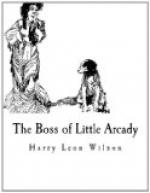For one, she had quickly divined that the ladies of Little Arcady considered her furniture to be unfortunate. She knew that they scorned it for its unstylishness; that some of them sympathized in the humiliation that such impossible stuff must be to her; while others believed that she was too unsophisticated to have any proper shame in the matter. These latter strove by every device to have her note the right thing in furniture and thus be moved to contrast it instructively with her own: as when Mrs. Judge Robinson borrowed for an afternoon Aunt Delia McCormick’s best blue plush rocker, Mrs. Westley Keyts’s new sofa, upholstered with gorgeous ingrain, and Mrs. Eubanks’s new black walnut combination desk and bookcase with brass trimmings and little spindled balconies, in which could be elegantly placed the mineral specimens picked up along the river bank, and the twin statuettes of the fluting shepherd and his inamorata. As Mrs. Judge Robinson herself possessed new and high-priced furniture, including a gold-and-onyx stand to occupy the bay window and uphold the Rogers group, “Going for the Parson,” as well as two fragile gilt chairs, which considerate guests would not sit in but leave exposed to view, and a complete new set of black walnut, the effect that day—which included a grand smell of varnish—was nothing less than sumptuous.
The occasion was a semi-monthly meeting of the Ladies’ Home Study and Culture Club, at which Miss Caroline was to be present. There had been a suspension of the Club’s meetings while Mrs. Potts was in abeyance, but on this day she was to enter the world again and preside over the meeting as “Madam President,” though the ladies sometimes forgot to call her that.
The paper read by Mrs. Potts—who was not at all ineffective in her black—was on “The Lake Poets,” with a few pointed selections from Wordsworth and others.
Whether or not Miss Caroline was rightly impressed by the furniture exhibit was a question not easy to determine. True, she stared at it with something in her eyes beyond a mere perception of its lines; but whether this was the longing passion of an awakened soul or the simple awe of the unenlightened was not to be ascertained at the moment.
Testimony as to her enjoyment of the President’s paper was more circumstantial. In the midst of this, as the listeners were besought to “dwell a moment on this exquisite delineation of Nature,”—expertly pronounced “Nate-your” by Mrs. Potts,—Miss Caroline turned her head aside as one deeply moved by the poet’s magic. But Marcella Eubanks, glancing at that moment into a mirror on the opposite wall,—a mirror in a plush frame on which pansies had been painted,—caught the full and frank exposure of a yawn. It was a thorough yawn. Miss Caroline had surrendered abjectly to it, in the belief—unrecking the mirror—that she could not be detected.
The discussion that followed the paper—as was customary at the meetings—proved to be a bit livelier. Each lady said something she had thought up to say, beginning, “Does it not seem—” or “Are we not forced to conclude—”




